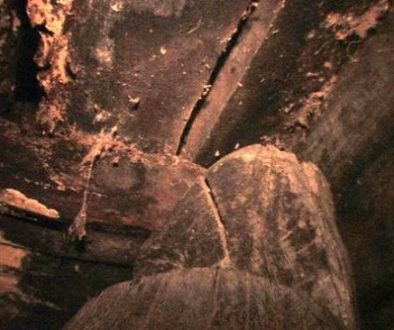Solomon relic a fake
JERUSALEM – An ivory pomegranate long touted by scholars as the only relic from Solomon’s Temple is a forgery, the Israel Museum said Friday, as investigators said they had broken up several fake antiquity rings in a wide-ranging investigation.
Indictments in that investigation are to be handed down next week, the officials said on condition of anonymity.
Among those to be indicted is Israeli collector Oded Golan, the Justice Ministry confirmed. Golan, who denied wrongdoing, owns the two most spectacular artifacts declared fakes last year: a burial chest purported to be that of James, the brother of Jesus, and a stone tablet with inscriptions on how to maintain the Jewish Temple.
The pomegranate was examined by the museum independently of the probe by the Israeli authorities, said the director of the Israel Museum, James Snyder.
A team of experts found the thumb-sized pomegranate dates to the Bronze period, or about 3,400 years ago, meaning it is considerably older than the first Jewish Temple, and the inscription was added recently, the museum said in a statement.
The inscription, in ancient Hebrew lettering, reads: “Belonging to the Temple of the Lord (Yahweh), holy to the priests.”
Scholars had believed the cream-colored pomegranate, which has a hole in the bottom, was used as the top of a scepter carried by a temple priest.
The temple was built in the 6th century B.C. and expanded by Herod before being destroyed in the year 70. Today, the Dome of the Rock — a Muslim shrine that is part of the Al Aqsa complex — is located near the site of ancient temple.
Archaeologists identify traces of ‘miracle’ pool
The pomegranate was bought from an anonymous collector by the Israel Museum for $550,000 in the 1980s, with the money deposited into a secret Swiss bank account at the time. The museum did not say whether it would ask police to investigate the transaction.
Snyder said the pomegranate was examined by several scholars before and after the purchase and was authenticated for the museum by Israeli archaeologist Nahman Avigad.
The director said the pomegranate was examined with the technologies available at the time. “I think care was taken,” Snyder said. “If one does not take advantage of opportunities to bring into a museum setting objects that don’t surface in excavations, you might miss great objects.”
He said the pomegranate was re-examined with a new type of microscope that detected synthetic material in the inscription, between the ivory and the patina.
The museum said another ancient object displayed with the pomegranate, a 2,600-year-old silver amulet with a priestly blessing carved into it, was re-examined and deemed authentic.
Other forgeries uncovered
The pomegranate’s inscription is the third major case of forgery to be uncovered recently, according to Israeli investigators.
Last year, Israel’s Antiquities Authority said the inscriptions on the purported burial chest of Jesus’ brother and on a tablet with instructions for temple repairs were also fakes.
The James ossuary, with the words “James, son of Joseph, brother of Jesus,” had been touted as a major archaeological discovery — the oldest physical link between the modern world and Jesus.
Debate over ‘Jesus inscription’ rises again
Israeli experts said that while the ossuary, a 2,000-year-old limestone box, was indeed ancient, parts of the inscription were added in modern times.
The existence of the box was first revealed at a 2002 news conference by the Biblical Archaeology Review, a Washington-based magazine. Its editor, Hershel Shanks, has said he believes the burial box is authentic and that the debate around it is fraught with “archaeological politics.”
Some U.S. scholars have said the Israeli investigation was flawed.
The Justice Ministry would not say whether the forgery charges against Golan would be filed in connection with the James ossuary.
“To the best of my judgment and according to the opinions of many world-renowned experts, the inscription on the James ossuary, which has been in my collection for over 25 years, is genuine,” Golan said Thursday.






